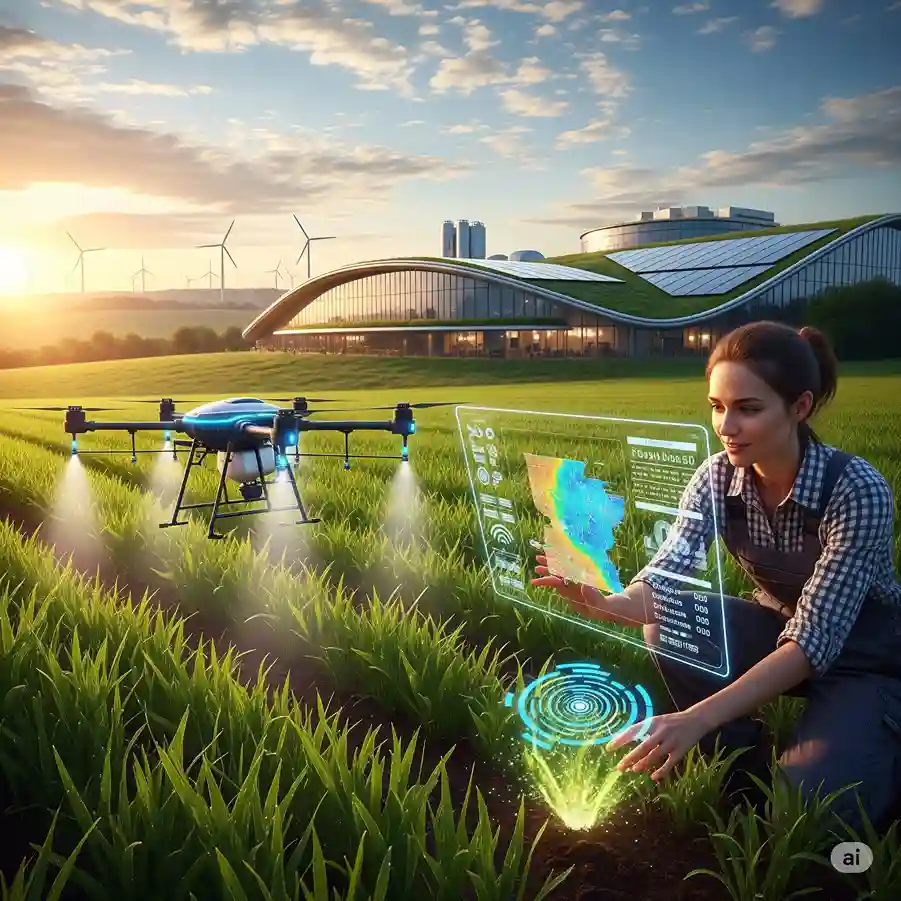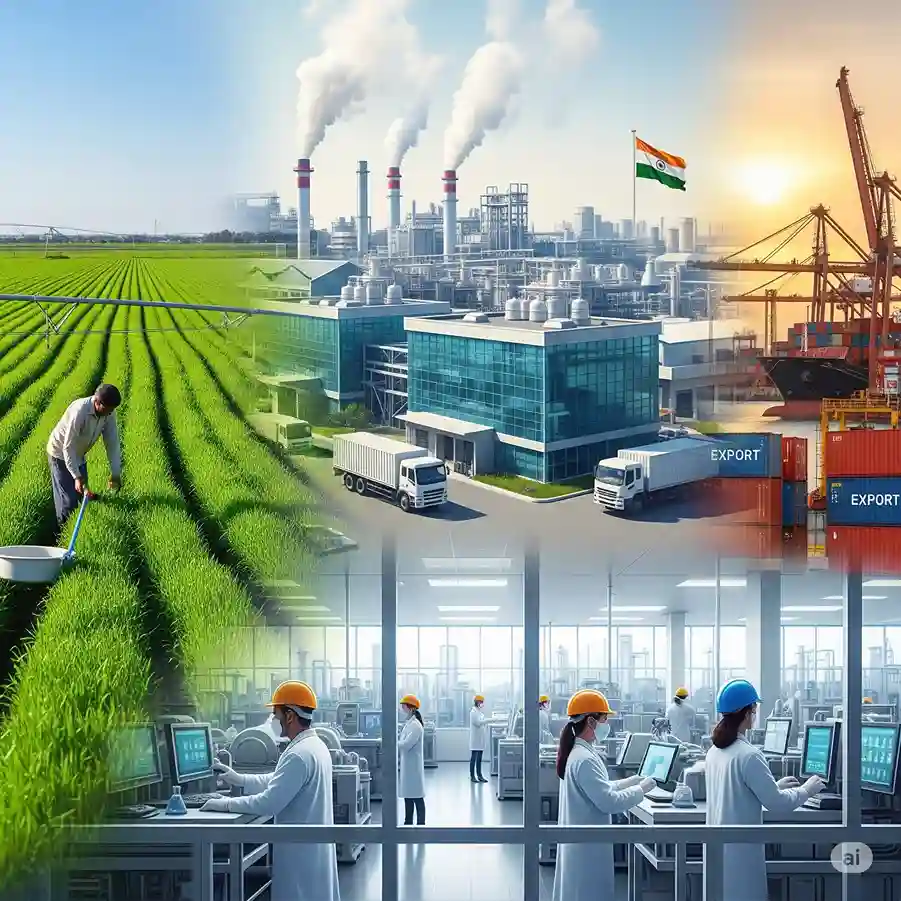In India, where agriculture supports more than half the population, it remains the foundation of many economies. Agriculture today is very different than it was even a few decades ago. Modern agriculture is heavily reliant on scientific inputs due to the increasing global population, the limited amount of cultivable land and climate change. Agro-chemicals, fertilizers, and pesticides are all important in improving yields, protecting plants, or ensuring food safety.
This sector is one of the best opportunities for entrepreneurs in 2025, and beyond. Global demand, technological innovation, and government policies that encourage new ventures are fertile grounds for the agrochemical and fertilizer industry.

Market Outlook: The Story of Growth
Global fertilizer market is expected to reach USD 270 billion in 2030. In this market, nitrogen-based fertilisers continue to be dominant, but phosphate and potassium fertilizers also hold significant shares. India is the world’s second largest consumer of fertilizers, behind China. It accounts for almost 18% of the global demand.
The global agrochemicals market is estimated at USD 250 billion. It is expected to exceed USD 315 billion in 2030. The agrochemical industry in India is growing by 8-10% per year, and exports will reach USD 5.5 billion by 2023 (Chemical Weekly August 2025).
Global Market Forecasts of Fertilizers and Agrochemicals
| Segment | 2023 Market Size in USD Bn | Forecast for 2030 (USD Bn). | CAGR (%) |
| Fertilizers (Total) | 210 | 270 | 3.5 |
| – Nitrogen Fertilizers | 120 | 150 | 3.2 |
| Phosphate Fertilizers | 55 | 70 | 3.5 |
| – Potash Fertilizers | 35 | 50 | 4.5 |
| Agro-Chemicals (Total) | 250 | 315 | 3.6 |
| – Pesticides | 120 | 150 | 3.2 |
| Herbicides | 80 | 105 | 4.0 |
| Fungicides | 50 | 60 | 2.7 |
Demand Drivers
This expansion is driven by a number of key trends. The population growth is the main driver. The world population is expected to reach 9,7 billion people by 2050. This will increase the demand for fruits, vegetables, and grains. The amount of cultivable land is decreasing due to urbanization, climate change and other factors. This means that productivity per acre needs to increase.
A change in dietary habits is also a factor. A higher protein intake is increasing the demand for animal feed crops such as soya and corn. These crops require significant inputs of fertilizer. The demand for fruit and vegetables that are more susceptible to pests is also increasing the use agrochemicals.
A second factor is the drive for food security. The governments, especially in developing countries support fertilizer usage through subsidies, and encourage investment in domestic agrochemical production. Gleichzeitig, as consumers become more aware of sustainability, they are increasing their demand for eco-friendly crop-protection products and bio-fertilizers.
Read Our Project Report: Click Here
Fertilizer Manufacturing Process Insights
Fertilizers are manufactured in different ways.
- Nitrogen fertilizers: These are typically made from ammonia. Ammonia is synthesized using natural gas through the Haber-Bosch method. Urea, ammonium Nitrate, and Ammonium Sulfate are among the most commonly used forms.
- Phosphate Fertilizers (SSP or TSP): Produced by treating phosphate rocks with sulfuric or phosphoric acids.
- Potash Fertilizers are produced from potash ore, and refined to potassium chloride for agricultural use.
Bio-fertilizers are made by culturing microorganisms which fix nitrogen, soluble phosphorus or stimulate the growth of plants. The sustainability of this area is driving rapid growth.
Agro-Chemical Manufacturing Process Insights
Agrochemical production, especially pesticides, is a combination of chemical synthesis, formulation, and other processes. To produce a herbicide, for example, the active ingredient is synthesized through organic reactions. The active ingredient is then combined with stabilizers and surfactants in order to make the herbicide suitable for soil or spraying.
Quality control is essential in manufacturing, because the effectiveness of agrochemicals is heavily dependent on consistency. Pesticides and crop-protection products are tightly regulated around the world, so entrepreneurs entering this field must adhere to regulatory requirements.
Opportunities for Entrepreneurs
Startups have many options in the agrochemical and fertilizer industries. The production of specialty fertilisers, like water-soluble or micronutrient fertilizers that are demanded for high-value crops and horticulture, is a promising route. Precision farming is causing farmers to adopt these fertilizers.
Bio-fertilizers, bio-pesticides and other bio-products are also promising. The global organic farming movement, as well as the stricter restrictions on harmful chemicals are driving demand for natural alternatives. Startups that specialize in microbial fertilisers, neem pesticides or organic plant boosters are likely to find a niche.
Formulation and distribution also have a lot of potential. Many companies don’t produce their own active ingredients, but rather buy them in bulk to create custom formulations tailored for local conditions and crops. Entrepreneurs who have knowledge of local agriculture can flourish in this field.
Solvent recovery and recycling is emerging as an eco-friendly business model in agrochemical plants. Startups can lower costs and reduce their environmental footprints by helping large producers recycle waste streams.
A Step-by-Step Guide to Launching a Successful Complex NPK Fertilizer Enterprise
Key Global Players in Fertilizers and Agrochemicals
| Company Name | Country | Focus Areas |
| Nutrien Ltd. | Canada | Nitrogen, phosphate, potash fertilizers |
| Yara International | Norway | Sustainable solutions for nitrogen-based fertilizers |
| CF Industries | USA | Ammonia, urea, ammonium nitrate |
| Mosaic Company | USA | Fertilizers containing phosphorus and potassium |
| ICL Group | Israel | Potash, a speciality fertilizer |
| Bayer CropScience | Germany | Agro-chemicals (pesticides, herbicides, fungicides) |
| Syngenta (ChemChina) | Switzerland/China | Crop protection, bio-agro solutions |
| UPL Limited | India | Bio-solutions for crop protection chemicals |
| Coromandel International | India | Fertilizers and specialty nutrients |
| Sumitomo Chemical | Japan | Agro-chemicals, crop protection, bio-pesticides |
The multinationals dominate the global market but they also offer opportunities to niche and specialized startups.

Challenges to Consider
The market is lucrative but not without its challenges. The biggest obstacle is probably regulatory compliance. Fertilizers, agrochemicals and pesticides are heavily regulated in order to protect both consumers and farmers. It can take a long time and be expensive to obtain approvals, licenses and certifications.
The volatility of raw materials, such as natural gases (for nitrogen fertilisers) or phosphate rocks, can impact profitability. Moreover, the public’s perception of chemical pesticides, which is often linked to environmental damage, requires companies innovate and invest in more sustainable, safer products.
Global giants dominating bulk production is another challenge. Direct competition in pesticides or commodity fertilizers may not be feasible for startups. Differentiation through specialization, such as organic ingredients, formulations specific to a region, or bio-based alternative, is the better path.
India’s Strategic Advantage
India is a country with many unique advantages in this field. India has a strong domestic market due to its large agricultural base, constant fertilizer demand and skilled workforce in chemical manufacturing. The government’s subsidy program for fertilizers, which amounts to more than USD 15 billion per year, ensures that farmers can afford fertilizers, stabilizing the demand.
India’s chemical manufacturing industry is strong, and this provides a cost advantage in exporting agrochemicals. In global supply chains for generic agrochemicals, India is becoming a more attractive alternative to China. This change presents Indian entrepreneurs with a great opportunity to establish themselves on the global market.
Read Our Book: Click Here
Conclusion
Sustainability, innovation and food security will define the future of agrochemicals and fertilizers. The traditional pesticides and fertilizers will continue to be the most popular, but specialty fertilizers, eco-friendly agrochemicals, and bio-fertilizers will grow at a faster rate.
With the advent of precision farming and digital agriculture, startups could benefit from the integration of agrochemicals and smart application technologies, such as drone spraying and soil nutrient mapping.
Discover the Right Business for You With Our Startup Selector Tool
About Niir Project Consultancy Services
Niir Project Consultancy Services is a partner that entrepreneurs can trust when exploring the opportunities available in agrochemicals and fertilizers. NPCS prepares Market Surveys and Detailed Techno Economic Feasibility Reports that cover manufacturing processes, raw material, plant layouts, financial projections, etc. NPCS has decades of experience in helping startups to assess the feasibility and make confident decisions.
Agro-Chemical And Fertilizers: Frequently Asked Questions (FAQs)
Q1: How big is the market for agro-chemicals and fertilizers, and is it really growing?
The market is huge and getting bigger. Fertilizers could reach $270 billion by 2030. Agro-chemicals might hit $315 billion. India is one of the fastest-growing places.
Q2: What’s causing this growth?
More people need more food. There’s not much new farmland, so farmers use more fertilizer. Diets are changing and need more crops. Governments support the industry to keep food supplies steady.
Q3: What are the best opportunities for a new entrepreneur in this sector?
Don’t try to compete with the biggest companies. Focus on specialty fertilizers or eco-friendly bio-products. Custom blends for local crops work well. Recycling and solvent recovery services are smart ideas.
Q4: What are the biggest challenges I should be aware of?
Regulations are strict and hard to manage. Prices for supplies can change fast. Big companies control most of the market. People worry about chemical safety, so safer products matter.
Q5: Why is India a good place to start this kind of business?
India has a huge farming market. The government helps with subsidies. The workforce knows chemicals well. India is also growing as a global supplier.
Q6: What is the future of the agro-chemical and fertilizer industry?
The future is green and tech-driven. Eco-friendly products are rising. Specialty fertilizers are in demand. New tech like drones and soil sensors are taking off.







